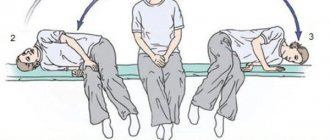Now everyone knows that people have complexes. Not so well known, although much more important from a theoretical point of view, is the fact that complexes can possess us.
Jung. Review of complex theory
The term complex comes from the Latin complexus
- connection, combination.
This Latin term has been used for a very long time, including in medicine, for example, complex of symptoms
.
The idea of using associations
to explain mental processes was so popular in the 19th century that a whole direction arose -
associative psychology
, which studies
complexes of ideas
, the roots of which go back to the 18th century. to the philosophical works of David Hume.
The merit of psychoanalysis is not the introduction of the term complex
, and not the use
of associations
to explain mental activity, but the creation of
a new method of treatment
as a result of the study of complexes.
In Ozhegov's dictionary
COMPLEX, -a, m. 1. Set, combination of something. K. machines. K. representations. 2. A set of interconnected sectors of the national economy or enterprises of various sectors of the economy. Agro-industrial complex. Territorial-production complex. Military-industrial complex. Fuel and energy complex. 3. Group of buildings and structures for a single purpose. Architectural, animal husbandry, sports, tourism * Inferiority complex - a painful awareness of one's shortcomings, inferiority in some way. respect. With a who complex (colloquial) - about someone who is painfully dissatisfied with something. in yourself. Without complexes who (colloquial) about who is normal, confident. || adj. complex, -th, -oe (to 1 value). Comprehensive production automation. * Complex (complex) number (special) - the sum of real and imaginary numbers.
Causes
The causes of complexes may be the following:
- Wrong upbringing. The most important role for a child is the opinion of his parents about him.
If during the process of upbringing the mother or father repeatedly pointed out any shortcoming of the child, this may lead to the creation of a corresponding attitude in him. - Influence of friends. In childhood, when the child is not yet able to fully form his self-esteem, it is significantly influenced by his peers, especially those with whom he has established friendships. If friends were inclined to express their opinions about any qualities of the child in a negative way, this attitude towards themselves may persist into adulthood.
- Intimate partner. During puberty, especially during the first intimate experience, a teenager very acutely experiences dependence on the opinions of others. If a partner or person for whom an individual feels sympathy unintentionally or deliberately negatively evaluates any character trait or appearance, this can cause a complex to arise.
- Own perception. The reason for the development of a complex may be a person’s own attitude towards his qualities, even if those around him do not allow themselves to focus on this or that person’s shortcoming. Comparing oneself with others in the presence of any real shortcoming, as well as a tendency to low self-esteem, can also be the cause of a person’s complexes.
For the most part, the reasons for the emergence of complexes are associated precisely with a person’s childhood experiences, which retain subjective significance for a person in adulthood.
In the dictionary D.N. Ushakova
COMPLEX, complex, male. (Latin complexus, lit. plexus). 1. A set, a combination of phenomena or properties. A complex set of social relationships. A complex of painful manifestations. Complex of representations. 2. (kick only complex). A teaching method in which primary education subjects are taught not separately from each other, but together, in a common connection (neol. ped.). 3. A set of sexual ideas that unconsciously manifest themselves in a person’s mental structure (Freudian term; medical, psychic). Oedipus complex.
How to stop having complexes?
How to deal with the problem? Advice from psychologists will help you.
About acne
I have complexes due to acne: how to remove the complex? In fact, many teenagers and very few adults suffer from this complex, since as they grow older, acne will disappear on its own - in other words, it is not a problem that you will have to deal with for a long time.
If you don’t want to wait, there are a lot of remedies that can significantly reduce their appearance.
Due to completeness
How to get rid of the complex of completeness?
This question concerns girls more than boys, although the former and the latter should not be upset at all, especially if this is perceived as a reason for unattractiveness to people of the opposite sex.
Often the reason for this complex is the imposition by TV and other information resources of their own concepts of beauty, although in reality it is very different from reality.
Many men and women like representatives of the opposite sex, as they say, “in the body.” For an impressive portion of the remaining ones, appearance does not play a primary role - that is, it is not a decisive factor in choosing a partner.
At the same time, the presence of a complex, a painful awareness of one’s own inferiority will only do harm - it is much better to behave absolutely naturally.
In the Encyclopedia Dictionary
in psychology - the combination of individual mental processes into a whole. In a narrow sense, a group of heterogeneous mental elements connected by a single affect; one of the basic concepts of depth psychology. According to the psychoanalysis of S. Freud, the complex is formed around drives that have been repressed into the unconscious (for example, the so-called Oedipus complex as a result of the repression of hostile impulses towards the father in early childhood). In A. Adler’s “individual psychology” the main role is given to the so-called. inferiority complex - an individual’s feeling of his organic or mental deficiencies. - (from the Latin complexus - connection, combination), a set of objects or phenomena that make up one whole.
complex
complex
I m.
1. A set, a combination of something (objects, phenomena, processes, etc.).
2. A set of specialized enterprises, economic sectors, etc. connected with each other.
3. A group of buildings and structures of the same purpose.
II m.
Painful feeling of one’s own shortcomings (both real and imaginary); inferiority complex.
Source: Modern explanatory dictionary of the Russian language on Gufo.me
Meanings in other dictionaries
- Complex - I Complex (from Latin complexus - connection, combination) a collection of objects, phenomena or properties that form one whole. II Complex (mathematical) is one of the basic concepts of combinatorial topology (See Combinatorial topology). Great Soviet Encyclopedia
- complex - A set, a combination of objects, actions, phenomena or properties that make up one whole. Great Accounting Dictionary
- Complex - Partially ordered by a reflexive, regular and transitive relation < a set of any elements t, together with an integer function dim t, called the dimension of the element t,[t: t'], called the incidence coefficient of elements tu t'... Mathematical Encyclopedia
- COMPLEX - COMPLEX (lat. complexus - connection, combination) - a polysemantic concept of modern psychology, used mainly in the following basic meanings: 1) A relatively stable sequence of associative chains... The latest philosophical dictionary
- complex - noun, m., used. compare often (not) what? complex, why? complex, (I see) what? complex, what? complex, about what? about the complex; pl. What? complexes, (no) what? complexes, why? complexes, (I see) what? complexes, what? complexes, about what? about complexes... Dmitriev's Explanatory Dictionary
- complex - COMPLEX -a; m. [from lat. complexus - combination, connection] 1. Set, combination of objects, phenomena, actions, properties. K. gymnastic exercises. K. satellite television. Natural K. Cosmic K. K. representations. Solve a number of issues. Kuznetsov's Explanatory Dictionary
- COMPLEX - (from Latin complexio - connection, connection; totality; story; conclusion). 1. In the broadest sense, K. is a collection of diverse and at the same time somewhat (for example, functionally, genetically) similar “objects” that make up one whole (sports K. Big Psychological Dictionary
- COMPLEX - COMPLEX (from Latin complexus - connection, combination, connection) - English. complex; German Complex. 1. A set of certain phenomena, objects, concepts, processes, etc., constituting a single whole. Sociological Dictionary
- Complex - (English association). If two or more objects are found together and it can be proven that they were in this place at the same time, they are considered to be in a true or closed K. or forming such a K. In the case of an open ... Archaeological Dictionary
- COMPLEX - COMPLEX - in psychology - the combination of individual mental processes into a certain whole. In a narrow sense, a group of heterogeneous mental elements connected by a single affect; one of the basic concepts of depth psychology. According to psychoanalysis... Big encyclopedic dictionary
- Complex - Syn. complex group formed by several elements. Encyclopedic Dictionary of Brockhaus and Efron
- complex - -a, m. A set, a combination of objects, phenomena, actions, properties. Architectural complex. A set of gymnastic exercises. □ He fell in love with France, with the whole complex complex that this word covers: the French language, the French joke... Small Academic Dictionary
- complex - K'OMPLEX, complex, male. (Latin complexus, lit. plexus). 1. A set, a combination of phenomena or properties. A complex set of social relationships. A complex of painful manifestations. Complex of representations. 2. (kick only complex). Ushakov's Explanatory Dictionary
- complex - Complex, m. [Latin. complexus, lit. plexus]. 1. A set, a combination of phenomena or properties. A complex set of social relationships. A complex of painful manifestations. Complex of representations. Large dictionary of foreign words
- complex - COMPLEX, a, m. 1. Set, combination of something. K. machines. K. representations. 2. A set of interconnected sectors of the national economy or enterprises of various sectors of the economy. Agro-industrial k. Territorial-production... Ozhegov's Explanatory Dictionary
- complex - Complex/. Morphemic-spelling dictionary
- Complex - (Latin complexus - connection, combination). 1. A group of correlated or associated factors. For example, a group of symptoms united by the concept of a symptom complex, syndrome; 2. In the psychology of memory - a group of closely related memories (Muller GE);... Explanatory dictionary of psychiatric terms
- complex - orf. I complex, -a (math.) II complex, -a Lopatin's spelling dictionary
- complex - Borrow. at the end of the 19th century from English lang., where complex < lat. complexus “combination, connection” (the original word plectere “to weave, weave, bind”, the same root as to weave, see). Complex literally means “smth. closely tied together." Shansky Etymological Dictionary
- complex - COMPLEX a, m. complexe m., adj. > English complex <lat. complexus. 1. A set of homogeneous elements that make up a certain whole. Pavlenkov 1911. Set, combination of objects, phenomena, properties. A set of gymnastic exercises. BAS-1. Dictionary of Gallicisms of the Russian language
- Complex - In psychology, a combination of individual mental processes into a whole. In a narrow sense, a group of heterogeneous mental elements connected by a single affect; one of the main concepts of depth psychology. According to the psychoanalysis of S. Freud... Pedagogical terminological dictionary
- COMPLEX - (from Latin complexus - connection, combination) 1) a set, a combination of objects, objects, actions, closely related and interacting with each other, forming a single integrity; 2) a group of interrelated industries, sub-sectors, enterprises... Economic dictionary of terms
- Blog
- Jerzy Lec
- Contacts
- Terms of use
© 2005—2021 Gufo.me
In the dictionary Dictionary of foreign words
a, m.
1. A set, a combination of something K. mechanisms. K. exercises. Complex - being a complex.
2. A set of interconnected sectors of the national economy. Fuel and energy plant
3. A group of buildings and structures for a single purpose. Architectural k. Sports k. Inferiority complex - painful awareness of one's own shortcomings. With a complex (colloquial) - about someone who is painfully dissatisfied with something in himself. Without complexes (colloquial) - about someone who is overly self-confident, does not have any doubts about his own qualities.
Share the meaning of the word:
Basic concepts and definitions
What are complexes in humans?
Complexes are a distorted self-esteem of a person that differs from the objective opinion, as a result of which he experiences a stressful state.
At the same time, as a rule, he strives to hide his shortcomings from others.
What does it mean to have a complex? To have a complex is to experience embarrassment, embarrassment, and emotional suffering from the fact that others will evaluate the qualities that a person considers to be his shortcomings.
As a rule, a complex person is withdrawn, as he strives to hide his shortcomings.
At the same time, this position often does not allow him to fully reveal his capabilities, fetters actions and expressions of emotions, and prevents him from adapting to the situation.
A complex person often experiences anxiety when making any decision and is prone to doubt. He may avoid contact with others, fearing ridicule of himself and negative evaluations.
Sometimes the desire to hide one’s imaginary shortcomings leads to atypical, inappropriate actions - a sharp interruption of communication, refusal of what one wants when it becomes available for the reason that a person feels unworthy of any benefits.
>However, complexes can also lead to a difficult experience of the success of those around them and even those closest to them - while a complex person may feel envy of those who, in his opinion, do not have such shortcomings and try to prevent them from achieving success.
A person devoid of complexes accepts himself as he is - at the same time, he maintains objective self-esteem, but does not experience negative feelings due to the presence of any shortcomings.
He does not focus on his weaknesses, which allows him to use his strengths more effectively.
Rules for getting out of the victim role
According to the components of the victim role, the following rules for exiting it can be distinguished:
- Express all emotions, including negative ones, but do it in a socially acceptable way.
- State your needs, desires, interests, opinions.
- Accept and love yourself.
- Set personal boundaries and learn to protect them (without violence and aggression).
- Never tolerate anything.
- Get rid of phobias, learn to live alone with yourself.
- Gain physical, psychological, material, social independence.
Algorithm for getting rid of the Electra complex
Work plan to get rid of the syndrome:
- Go through all the stages of grief, give free rein to anger and accept the loss of your father (mental or physical).
- Find the negative qualities of dad, accept the negative sides of his image.
- Restore relationships with your mother and yourself, that is, regain your femininity.
- Become a self-sufficient person, that is, stop perceiving men as a tool to satisfy your needs, learn to take care of yourself, protect and provide for yourself.
It is important! Treatment is impossible without recognizing the problem.










